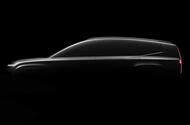Teaser image published by Hyundai reveals close resemblance to the concept
New electric seven-seater, closely related to Kia’s EV9, will go on sale next year
The Hyundai Ioniq 9 will be revealed next month as the brand’s answer to the Volvo EX90.
The new electric seven-seater, twinned with the Kia EV9, is a development of the Seven concept shown three years ago. Although it was originally billed to be badged as Ioniq 7, Autocar understands it was renamed because ‘7’ would have implied it was lesser than the EV9.
The Ioniq 9 will use the same extended version of the e-GMP platform as its twin and is also likely to have the same 99.8kWh battery pack. As with the EV9, 200bhp single-motor and 378bhp dual-motor set-ups will be offered. In the Kia, they yield ranges of 349 and 313 miles respectively.
It is likely that the SUV will gain a hot N variant, given that a ‘GT’ version of the EV9 has already been spied testing at the Nürburgring. This makes a case for the Ioniq 9 to use the 641bhp dual-motor, four-wheel-drive powertrain that propels the Ioniq 5 N.
In contrast to the blocky EV9, the Ioniq 9 will feature a sloping roofline and more curvaceous bodywork. Elements of the Seven concept are retained, including its lighting signatures and flared haunches. Frameless windows and rear coach doors have been scrapped, with Ioniq 9 prototypes being seen with traditional B- and C-pillars and conventional door handles.
Its interior will be similar to that of the new Hyundai Santa Fe. The digital instrument display and infotainment touchscreen are the focal point, with the latter angled toward the driver.
In keeping with other Hyundai models, such as the Kona, physical controls will be retained for audio and climate. Less important functions such as the air direction are mapped to a touch panel between the climate dials. The gear selector is the same as that in the Santa Fe: a twisting dial on the steering column.
The first examples of the Ioniq 9 will arrive in the UK next year. Pricing is likely to start between £60,000 and £70,000, which would undercut the EX90 by around £30,000.
Source: Autocar
